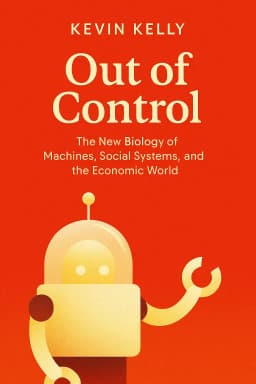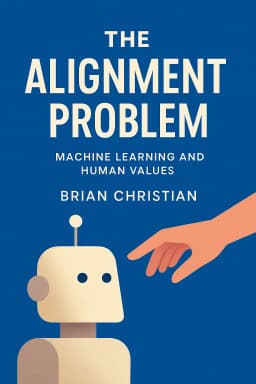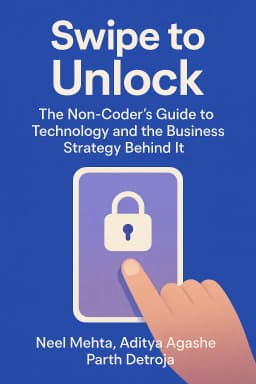
The Biology of the Market: Why 'Out of Control' is the New Strategy
Golden Hook & Introduction
SECTION
Orion: What if the best way to build the next revolutionary tech company, or to navigate the chaos of the financial markets, isn't to tighten your grip, but to let go completely?
George Li: It’s a counterintuitive thought, isn't it? We're often taught to admire visionaries like Steve Jobs, who were masters of meticulous, top-down control. Every detail, every pixel, was by design.
Orion: Exactly. But what if the future belongs to systems that are, by their very nature, 'out of control'? That's the provocative idea at the heart of Kevin Kelly's classic book, "Out of Control: The New Biology of Machines, Social Systems, and the Economic World." And it's what we're exploring today with business analyst George Li. George, thanks for being here.
George Li: Great to be here, Orion. It's a fascinating topic. As someone who analyzes systems for a living, the idea of intentionally designing a system you can't control is both terrifying and exciting.
Orion: I can imagine. And what's amazing is that Kelly wrote this in the early 90s, but it feels more relevant now than ever. He predicted a world where our man-made creations—our technology, our companies, our economies—would become so complex that we'd have to turn to nature to understand how to manage them.
George Li: The world of the born teaching us how to manage the world of the made.
Orion: Precisely. So today we'll dive deep into this from two main perspectives. First, we'll explore the power of the 'hive mind' and what we can learn from nature's most successful organizations. Then, we'll discuss the paradox of winning by letting go, and how these new rules are rewriting economics in our networked world.
Deep Dive into Core Topic 1: The Power of the Swarm
SECTION
Orion: So George, let's start with that first idea: the power of the swarm. The book has this incredible quote: "There is nothing to be found in a beehive that is not submerged in a bee. And yet you can search a bee forever... and you will never find a hive."
George Li: The whole is greater than the sum of its parts. It's a classic concept, but Kelly takes it to a radical place.
Orion: He really does. He tells this personal story about his years as a beekeeper. He describes the moment a swarm decides to find a new home. It’s not the queen bee making the decision. She’s essentially a follower, dragged along by the collective will.
George Li: So who is in charge?
Orion: Nobody. And everybody. That's the mind-bending part. Scout bees fly out and find potential new locations for the hive. When they return, they perform a 'dance'. The vigor and duration of this dance communicates the quality of the location they found. Other bees watch these dances, and then they fly out to inspect the most promising sites themselves.
George Li: So they're gathering and verifying data, in a way.
Orion: Exactly. And when they return, they join the dance for the location they prefer. It’s a democratic process, a real-time poll. Slowly, a consensus builds around one dance, one location. More and more bees join that specific dance until it becomes an overwhelming, unified signal. At that point, the entire swarm—tens of thousands of bees—lifts off and flies directly to the chosen spot, with the queen swept up in the middle of it all.
George Li: That's a powerful image. A massive, complex decision made with no CEO, no board meeting, no central command. In finance, we are obsessed with command-and-control structures, especially for risk management. The idea of a system that works because no one is in charge is... unsettling, but also incredibly intriguing.
Orion: Unsettling is the right word. Kelly says the hive is a "radical matriarchy and sisterhood," a collective intelligence that emerges from the simple actions of thousands of individuals. No single bee understands the master plan. It just executes its simple, local rules.
George Li: You know, it makes me think about the push for agile methodologies in the corporate world. The theory is that small, self-organizing teams will produce better, more innovative results than a rigid, top-down project plan dictated by a manager. The manager's job is to clear obstacles, not to command every move.
Orion: It's the exact same principle. The intelligence is in the team, not just in the manager.
George Li: Right. But here’s a question that brings it back to the business world. A beehive has a single, shared, genetically programmed objective: survival and propagation. How does this 'hive mind' concept apply to a large company where the marketing department, the sales team, and the engineering division might have very different, even competing, goals and KPIs?
Orion: That is a fantastic question, George. It highlights the messiness of applying these biological metaphors. And it leads us perfectly to our second big idea. Because what happens when you scale this 'hive' principle up from a single organism to a global economic system? You get what Kelly calls 'network economics,' and you're right, the goals aren't always aligned. This is where we have to talk about the paradox of control.
Deep Dive into Core Topic 2: Winning by Letting Go
SECTION
George Li: The paradox of control. I like the sound of that. It feels very relevant to market dynamics. You can try to control for every variable, but the market will always surprise you.
Orion: It always will. Kelly lays out the pros and cons of these distributed, 'out of control' systems. The benefits are what he calls the five 'A's: Adaptability, evolvability, resilience, boundlessness, and novelty. Think of the internet itself. It’s a chaotic mess, but it can adapt to new technologies, it evolves constantly, and it’s incredibly resilient. If one part goes down, the rest just routes around it.
George Li: And it’s a source of endless novelty. No central planner could have ever designed YouTube, social media, or the entire app economy. It just… emerged.
Orion: Emerged is the key word. But there's a price to pay. Kelly is very clear about the drawbacks. These systems are non-optimal, meaning they're not the most efficient. They're non-controllable, non-predictable, and non-understandable. You can't fully grasp how the whole thing works. And they're not immediate; they take time to develop. He says, "Organic complexity entails organic time."
George Li: This is the classic Steve Jobs versus Bill Gates debate, isn't it? Or maybe more accurately, Apple versus the rest of the tech world.
Orion: Say more about that. That's a great connection.
George Li: Well, Steve Jobs was the ultimate central planner. The Apple ecosystem is a beautiful, walled garden. It's highly optimized, predictable, and understandable. It's not 'out of control' at all. Every part is designed to work perfectly with every other part. And for years, that model seemed vastly superior from a user experience and, importantly for my field, a profit margin perspective.
Orion: It's a very attractive model. It feels safe.
George Li: It does. But Kelly's argument, if I'm understanding it, is that the other model—the chaotic, open, 'non-controllable' world of the PC, of Android, of the open internet—ultimately creates more value and is more resilient in the long run. It's less efficient, sure, but it's more evolvable. It allows for more unexpected novelty.
Orion: And Kelly's core thesis is that as the world gets more complex, evolvability will always beat efficiency in the end. A perfectly efficient machine is brittle. An adaptable ecosystem survives.
George Li: We're seeing this play out in my industry right now. The walled gardens of traditional banks are being challenged by the decentralized, open protocols of DeFi, or Decentralized Finance. The banks offer security, predictability, and a single point of contact—that's the 'control' model. DeFi offers novelty, boundlessness, and a system owned by no one—that's the 'out of control' model. As an analyst, you have to constantly ask which system is more 'evolvable' and where the long-term growth will be. It's a fundamental strategic question.
Orion: And the book's answer would be that you can't import evolution and learning without exporting control. You have to make a trade.
George Li: You have to be willing to accept a little chaos to get a lot of innovation. That's a tough pill to swallow for a lot of institutions.
Synthesis & Takeaways
SECTION
Orion: So, to bring it all together, we have these two powerful, connected ideas from "Out of Control." First, that true intelligence and complex solutions can emerge from the bottom-up, like in a swarm, without a central commander.
George Li: And second, that in our increasingly networked world, the systems that thrive are often the ones that give up total control in exchange for resilience and the power to evolve. The systems that embrace the network effect, where, as Kelly says, "more brings more."
Orion: So, as a business analyst who thinks about technology and strategy all day, what's the big, practical takeaway for you from all this?
George Li: For me, the big takeaway is that our role as analysts, strategists, and leaders might be fundamentally changing. Maybe we're less like architects designing a perfect, static skyscraper, and more like gardeners.
Orion: I love that metaphor. A gardener versus an architect.
George Li: Exactly. An architect can plan every last detail. A gardener can't control how every leaf will grow or where every root will spread. But they can tend the soil, provide water and sunlight, pull a few weeds, and basically create the conditions for a healthy, resilient, and productive ecosystem to grow on its own. It's a profound shift in mindset from engineering to cultivation.
Orion: That's a perfect way to put it. You're not building the thing itself; you're building the system that builds the thing. Kelly calls it "harnessing the power of organic machines."
George Li: And the great irony, as the book points out, is that letting go is the only way to win.
Orion: A fantastic summary. So for everyone listening, especially those of you who design processes, manage teams, or invest in new technologies, here's the question to ponder this week, inspired by George's insight: What is one system in your world that you're trying to architect, that you should be gardening instead?
George Li: A great question to end on. Thanks, Orion. This was a lot of fun.
Orion: Thank you, George.









